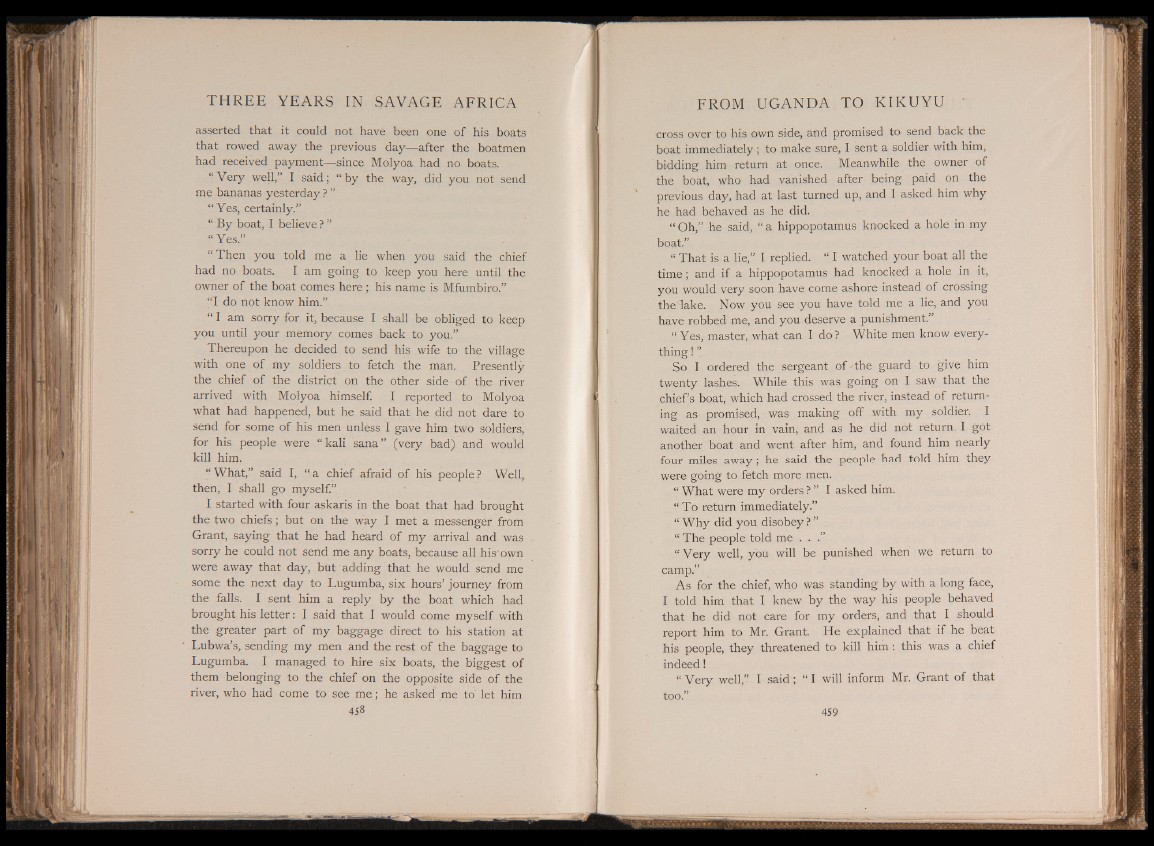
asserted that it could not have been one of his boats
that rowed away the previous day—after the boatmen
had received payment—since Molyoa had no boats.
“ Very well,” I said; “ by the way, did you not send
me bananas yesterday ? ”
“ Yes, certainly.”
“ By boat, I believe ? ”
“ Yes.”
“ Then you told me a lie when you said the chief
had no boats. I am going to keep you here, until the
owner of the boat comes here; his name is Mfumbiro.”
“I do not know him.”
“ I am sorry for it, because I shall be obliged to keep
you until your memory comes back to you.”
Thereupon he decided to send his wife to the village
with one of my soldiers to fetch the man. Presently
the chief of the district on the other side of the river
arrived with Molyoa himself. I reported to Molyoa
what had happened, but he said that he did not dare to
send for some of his men unless I gave him two soldiers,
for his people were “ kali sana” (very bad) and would
kill him.
“ What,” said I, “ a chief afraid of his people ? Well,
then, I shall go myself.”
I started with four askaris in the boat that had brought
the two chiefs; but on the way I met a messenger from
Grant, saying that he had heard of my arrival and was
sorry he could not send me any boats, because all his'own
were away that day, but adding that he would send me
some the next day to Lugumba, six hours’ journey from
the falls. I sent him a reply by the boat which had
brought his letter: I said that I would come myself with
the greater part of my baggage direct to his station at
Lubwa’s, sending my men and the rest of the baggage to
Lugumba. I managed to hire six boats, the biggest of
them belonging to the chief on the opposite side of the
river, who had come to see me; he asked me to' let him
458
cross over to his own side, and promised to send back the
boat immediately; to make sure, I sent a soldier with him,
bidding him return at once. Meanwhile the owner of
the boat, who had vanished after being paid on the
previous day, had at last turned up, and I asked him why
he had behaved as he did.
“ Oh,” he said, “ a hippopotamus knocked a hole in my
boat.”
“ That is a lie,” I replied. “ I watched your boat all the
time; and if a hippopotamus had knocked a hole in it,
you would very soon have come ashore instead of crossing
the lake. Now you see you have told me a lie, and you
have robbed me, and you deserve a punishment.
“ Yes, master, what can I do? White men know everything
!
So I ordered the sergeant of The guard to give him
twenty lashes. While this was going on I saw that the
chief’s boat, which had crossed the river, instead of returning
as promised, was making off with my soldier. I
waited an hour in vain, and as he did not return. I got
another boat and went after him, and found him nearly
four miles away; he said the people had told him they
were going to fetch more men.
“ What were my orders ? ” I asked him.
“ To return immediately.”
“ Why did you disobey ? ”
“ The people told me . . .”
“ Very well, you will be punished when we return to
camp.”
As for the chief, who was standing by with a long face,
I told him that I knew by the way his people behaved
that he did not care for my orders, and that I should
report him to Mr. Grant. He explained that if he beat
his people, they threatened to kill him : this was a chief
indeed!
“ Very well,” I said; “ I will inform Mr. Grant of that
too.”